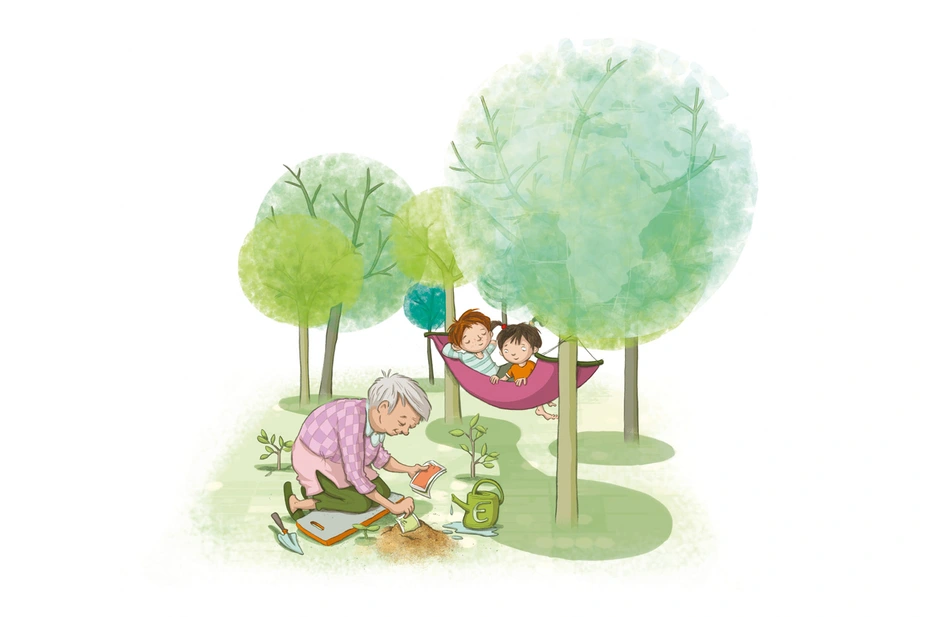Certifiably suitable for grandchildren
Essay by Holger Rust, economic sociologist, practicalist, and publicist
A number of auctions in recent years have shown that money can be made with sustainability, particularly the recent sale of early editions of a book called “Sylvicultura oeconomica, oder Hauswirthliche Nachricht und Naturmäßige Anweisung zur Wilden Baum-Zucht” penned by an author named Hans Carl von Carlowitz. Published in 1713, this book on forestry is relevant in this here article, because, as many readers of this magazine will know, he was the first person ever to use the term sustainability. And so, 310 years later, it can count as more than a mere arabesque that this book, selling at about 1,500 to 2,000 euros, fits so neatly into the trend of the monetarisation of intellectual property.
Investing this sum into eco-stocks could, firstly, result in additional profit, and, secondly, in a nice little bildungsroman, which one could tell to one’s offspring, while expounding on their portfolio yields used for making a down payment on, say, a smart home or an electric vehicle.
It all feels a tad excessive and raises some suspicions, but sustainability itself has indeed become a business model. This can be deduced from the fact that this word, conceived ages and ages ago, now appears on search engines, in politics and business, mass and high culture more than a hundred million times, even when leaving out translations from all over the world. For those who use it, it is deemed a self-evident and ennobling concept meaning...well...what does it actually mean? What does it mean when everything is offhandedly spruced up with the term “sustainable”? And, second question, if the word’s pervasiveness were an actual reflection of our behaviour, shouldn’t we be able to have greater successes to show for ourselves?
We should watch out that this word does not sink to become mere semantic adornment. Used incessantly but devoid of real meaning, these types of words come and go. There’s “interesting”, for example, “tasty”, to use a slightly less high brow example that is sadly used for a sheer countless nuances of pleasant flavours. While this, too, is an old word, it has been tarnished by its overuse, not least by “super tasty”—its grotesque superlative.
But, as we all know, in matters of taste, and words, there can be no dispute. Luckily, there are ample alternatives as well as possible combinations that add clarification and plausibility to the word’s claim.
Consequently, you end up using another word, combining it with the first—sustainable that is—and are then able to demonstrate that the first is not just a mere lip service being paid: certifiable. In the same way as this issue of Adlershof Journal is doing, using many examples. This would require proving that one is committed to re-growing (or in German, “Wiederwachs”, to use another beautiful word from the above-cited 18th century book) what one has consumed—whether out of necessity or pleasure.
“Wiederwachs”. What a word!
Indeed, it should not go unmentioned that our time and age is also capable of inventing wonderful words, which could serve as synonyms for the excessively used “sustainable”: “enkeltauglich”, for example. Suitable for grandchildren. However, words are currently changing their meaning at a rapid pace to keep up with an ever-changing perceptions of reality and its manifold representations. And so, henceforth, we are probably also obliged to make the word gender-neutral and say “enkelInnentauglich”. Certifiably, of course.
Holger Rust is an economic sociologist, practicalist, and publicist. He lives in Schleswig-Holstein. His new book “Weise Voraussicht und Erfolgsplanung. Ziele, Inhalte und Strategien einer neuen Zukunftsforschung für Unternehmen” was published by Springer/Gabler in in spring 2021.
